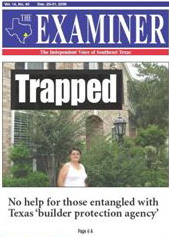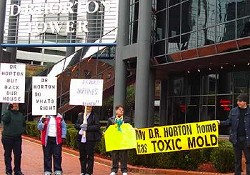|
Trapped – Demise of Texas Residential Construction Commission doesn’t end woes of consumers entangled in the ‘builder protection agency’
“In a homeowner survey conducted by my office, I found that 86 percent of homeowners who responded said their builder failed to fix construction defects in their homes,†wrote Strayhorn, who added, “If it were up to me personally, I would blast this TRCC builder-protection agency off the bureaucratic books.†Keep in mind that Strayhorn is a Republican and winner of statewide races where she was supported by Bob Perry. Her view of TRCC was shared by many in
Austin
, and three years later when the agency was up for Sunset review, the staff of the Sunset Commission echoed her conclusion and recommended that TRCC be abolished... Alex Winslow of the watchdog group Texas Watch. “The clock was ticking on the legislative session and (the builders) said ‘We don’t have time to get this back to where we want, so let’s just do away with it’ – and all parties said ‘Amen’.â€...“Without taking anything away from all the other victims, Dorina Corrrente is the poster child for people victimized by these builders,†said Ahmad. “The way that builder has treated her — I witnessed it in a meeting that we had. It was just a part of the overall scheme to intimidate... Their behavior has not changed when you look at other D.R. Horton subdivisions... While TRCC was in existence, (the builders) knew they had a partner in crime. See D.R. Horton Complaints page 1, page 2
The Examiner
Trapped
Demise of Texas Residential Construction Commission doesn’t end woes of consumers entangled in the ‘builder protection agency’
By James Shannon
Mid & South
County
Editor

|
|

Dorina Corrente

Dorina Corrente (second from right) protests at
D.R. Horton's headquarters in Fort Worth. |
| Tale of slander and toxic mold |
The cases before the Texas Residential Construction Commission (TRCC) are not just about houses. Reporting the story underscores the fact these cases are also about people.
Shortly after Dorina Corrente purchased a new D.R. Horton home in Sugar Land, she began to have drainage problems that left standing water in her yard. She felt this contributed to foundation problems that caused cracks in the walls and floors, and windows and doors that did not close properly. More worrisome was mold that appeared in different places in the house, which Corrente said caused her to suffer health problems.
After repeated consultations with D.R. Horton failed to repair these problems, Corrente pressed the builder to buy back her home. Their refusal led her to press her case with the state. She is one of a group of aggrieved homeowners who became regular visitors to the state capitol in Austin over a period of years to tell their horror stories about the builders they believe hid behind the TRCC to avoid fixing the defects that plagued their not-inexpensive new houses.
Corrente paid a price for her willingness to speak up. She was singled out for harsh treatment, first from homebuilder D.R. Horton and most egregiously by Duane Waddill, then executive director of TRCC.
When she testified at a hearing in Austin before the House Building and Industry Committee on March 23 of this year about her on-going struggle with the homebuilder, Waddill sought to dismiss her complaints and assailed her credibility by suggesting from the podium that she was mentally unstable and that D.R. Horton had to obtain "a restraining order against Mrs. Corrente to keep her off their property."
Presumably this meant that Corrente must have hallucinated the severe drainage, mold and foundation settling problems that have made her Greatwood home what she described as "a living hell."
Perhaps Waddill saw Corrente as an easy target because the 68-year-old Italian immigrant and American citizen still speaks with an accent after 44 years in this country, and she does feel she has suffered unnecessarily at the hands of the homebuilder and the state agency that is supposed to mediate this kind of dispute.
While many find this form of character assassination a despicable tactic that has no place in what is basically a business dispute, Waddill went too far in his assertions to the House committee - because the charge he leveled against Corrente was a lie. There was no restraining order.
The origin of this untruth provided an unwitting insight into how the TRCC in general - and director Waddill in particular - operated. When his casual slander blew up in his face, Waddill was forced to write a letter of apology to Corrente for his assertion that the builder had obtained a restraining order against her.
But where did the slander originate? Waddill's words offer stark testimony to the hand-in-glove relationship between builders and TRCC.
"D.R. Horton stated to my office that Ms. Corrente was barred from their offices because over time the company had developed concerns over their perception of her state of mind and comments made in public hearings by others on her behalf," wrote Waddill.
Janet Ahmad of HomeOwners for Better Building (HOBB) said she is very familiar with this case.
"Without taking anything away from all the other victims, Dorina Corrrente is the poster child for people victimized by these builders," said Ahmad. "The way that builder has treated her - I witnessed it in a meeting that we had. It was just a part of the overall scheme to intimidate. They didn't care about Dorina Corrente. Their behavior has not changed when you look at other D.R. Horton subdivisions. They do the same thing; most people give up; they have their lives to get on with."
Corrente has not given up and continues to press her case against the builder. Recently she traveled to Fort Worth for a protest at the D.R. Horton Tower, carrying a big sign that proclaimed "My D.R. Horton home has toxic mold."
| |
When the Texas Legislature failed to renew the much-maligned Texas Residential Construction Commission (TRCC) in the 2009 session, it marked the beginning of the end for the agency created in 2003 supposedly to mediate disputes between homebuilders and their customers who purchased new homes.
In practice, it didn’t quite work out that way. Bob Perry, who made a fortune building new houses, became the largest campaign contributor in
Texas
history and used that clout to create TRCC. It didn’t take long for consumers to realize the deck was stacked against them with an agency where the builders held all the cards.
That conclusion was reached by others who did not have problems with a defective new home, including then-Texas Comptroller Carole Keeton Strayhorn after her department conducted a 2006 performance audit of TRCC.
“In a homeowner survey conducted by my office, I found that 86 percent of homeowners who responded said their builder failed to fix construction defects in their homes,†wrote Strayhorn, who added, “If it were up to me personally, I would blast this TRCC builder-protection agency off the bureaucratic books.â€
Keep in mind that Strayhorn is a Republican and winner of statewide races where she was supported by Bob Perry. Her view of TRCC was shared by many in
Austin
, and three years later when the agency was up for Sunset review, the staff of the Sunset Commission echoed her conclusion and recommended that TRCC be abolished.
It wasn’t that simple, and despite the staff recommendation, the Sunset Commission voted unanimously to keep TRCC alive. After protracted legislative deliberations, the Business and Industry Committee under Rep. Joe Deshotel (D – Beaumont) reported out a bill that preserved TRCC with important consumer protections added that had not been in the original legislation. That bill was further amended before passing the House and was sent to the Senate.
In the end, TRCC died because of an impasse between reforms pushed by consumer groups and resistance from the homebuilding industry it was supposed to regulate.
“It became immediately clear once the reforms that Chairman Deshotel and others added that the builders just couldn’t live with it,†said Alex Winslow of the watchdog group Texas Watch. “The clock was ticking on the legislative session and (the builders) said ‘We don’t have time to get this back to where we want, so let’s just do away with it’ – and all parties said ‘Amen’.â€
Winslow said the demise confirmed the reality Strayhorn and homeowners alike had known for years.
“It became apparent that the TRCC might actually get some teeth, and the builders would have none of that, so they’d rather see it go away than have an agency that did anything,†he said.
While what the end of TRCC will mean for new homebuyers in the future remains unclear, the law is not ambiguous about the fate of purchasers of defective homes in
Texas
from 2003 to September 2009. The policies and procedures put into place by Bob Perry and the homebuilders when they willed the TRCC into existence will remain in effect for those consumers, their path to the courthouse door forever blocked by binding arbitration.
Ties that bind
Binding arbitration is a form of alternative dispute resolution that circumvents the court system to settle legal disputes in a manner that it theoretically fair to both parties, with decisions rendered quickly compared to traditional litigation. In practice, the results are dependent on a number of factors including the parameters of the dispute submitted to the arbitrator and the fundamental fairness of that arbitrator.
In the case of TRCC, the decisions of those arbitrators almost uniformly favored builders over consumers.
Janet Ahmad founded HomeOwners for Better Building (HOBB) in 1978 and pushed for the first lemon laws to protect consumers. She has been a fierce critic of TRCC since its inception and said the anti-consumer features of the legislation inevitably resulted in decisions that favored the builders. Ahmad said this is no accident and points language in the contracts for the sale of the new homes and other deficiencies.
“The contracts have binding arbitration,†she said, then cited “the lack of consumer protection laws; tort reform that was sponsored by (homebuilders) Bob Perry and David Weekly limiting liability on builders; and then you have no statutes that regulate these builders or what they build – there are none – and TRCC created the barriers – impossible barriers – for anyone to get anything done, because 88 percent of those who confirmed their defects never got anything done. They were faced with a legal dispute that was nurtured by TRCC. If there are no consequences for bad behavior, why would you care?â€
The conclusion reached by both Comptroller Strayhorn in 2006 – who said 86 percent of homebuyers said builders failed to fix defects in their homes – and Ahmad in 2009 – 88 percent of those who confirmed defects never got anything done – are strikingly similar.
“While TRCC was in existence, (the builders) knew they had a partner in crime. Maybe that’s not a good way to put it, but they definitely had TRCC nurturing their ability to ignore warranty claims,†said Ahmad.
Even without TRCC, binding arbitration is seen as a continuing problem by consumer advocates.
“The major barrier for most homeowners is the binding arbitration clause, and builders – most of them – have these binding arbitration clauses, which are onerous and require homeowners to sign away their legal rights before they ever buy the home,†said Winslow. “That’s one thing we can’t do anything about here, but the folks in
Washington
can do something about.â€
The dangers of binding arbitration became clear in the case of Jamie Leigh Jones, who was an employee of Houston-based engineering firm KBR – then a subsidiary of Halliburton – who claimed her fellow military contractors drugged and raped her and then held her in a shipping container while in Iraq in 2005. Her legal claim was denied because of a clause in her employment contract requiring that such claims be resolved through arbitration. Although her alleged rapists were American citizens, the crime could not be prosecuted in American courts because it happened in
Iraq
– and she was denied civil recourse because of her contract.
By the time a three-judge panel of the 5th U.S. Circuit Court of Appeals ruled in September 2009 that her lawsuit can go to trial, public outrage had brought the issue to the forefront.
“The notoriety that particular case has gotten and the abuses we have seen in the credit industry and the attention that has gotten has really raised the profile of the binding arbitration issue,†said Winslow. “I’m really hopeful that
Washington
will do something in the next year or two with regard to binding arbitration, whether it’s eliminating it outright or putting some limits on it.â€
Any such change in the law would no doubt be welcomed by many consumers – and the groups that advocate their cause in the halls of Congress. But it seems certain it would come too late to assist homeowners still suffering under the not-so-benign neglect of the expiring TRCC.
Winslow said their issues will likely remain frozen as the TRCC winds down before ceasing to exist on Sept. 1, 2010.
“There are still some people that are subject to the review process of TRCC. There aren’t any new people, but those that are still in the process are bound by it,†he said. “If their dispute arose before the agency lapsed, then they are still stuck with TRCC and the decisions made by the TRCC. Those people who had their homes built between 2003 and September 2009, they’re still bound by the laws that existed at the time.â€
Many of those homebuyers are still battling their builders in an attempt to remedy glaring defects in new homes they purchased. According to Ahmad, there is more troubled housing stock in the pipeline. She cited one new housing development near
Denton
as a prime example.
“The carelessness with which builders now just openly throw up houses because of TRCC,†sighed Ahmad. “If you look at the DR Horton subdivision, the
Savannah
community near
Denton
(about 40 miles northwest of
Dallas
), where you have a premiere developer – Huffines – that developed that land. I don’t know whether it was his fault, but I think it’s the fault of those who built the houses, because the houses are literally falling down.â€
Ahmad said residents report that foundation problems are rampant in
Savannah
.
“The first year, they started doing foundation repairs in terms of piers, major foundation repairs of some of those homes right at the end of the first year. During their second year they started shifting again right on the piers; one of them has slipped off its piers,†she said.
A review of more than a dozen letters obtained by The Examiner from Savannah residents to D.R. Horton CEO Don Tomnitz, they allege the builder used “substandard construction and design†resulting in numerous serious issues including “major foundation problems.†The letters detail specific damage because of these deficiencies and ask D.R. Horton “to enter into a buyback agreement within the next 30 days.†The letters were sent in late August 2009, and to date have not resulted in the builder buying back the homes.
Ahmad lays this dispute squarely on the doorstep of TRCC.
“If you don’t have any regulation and you have binding arbitration where your legal rights are taken away – no attorney will take your case – then what incentive does the builder have to put a foundation down that will last?†she asked.
Not a conspiracy theorist at heart, Ahmad nonetheless said she has no difficulties in following the trail of circumstances that resulted in these unhappy events.
“(Homebuilders) promulgated a contract that had binding arbitration in it, that if a consumer had a dispute it had to be arbitrated by the American Arbitration Association, so all they had to do was build a bad house and the builder would take the homeowner to binding arbitration,†she said. “When you lose basic, fundamental Constitutional rights of free speech and the right to a trial by jury – and they have done it; they’ve done it all – the consumer has nothing. You’ve got more protection with any other item you buy – a toaster, a coffee maker, a computer – you’ve got more recourse. But builders don’t care about their reputation; they have proven it. You can have complaint after complaint, articles in the newspaper – they don’t seem to care anymore.â€
Calls to D.R. Horton headquarters seeking comment for this article were not returned.
http://theexaminer.com/main.asp?SectionID=1&SubSectionID=61&ArticleID=3656 |
|
 Home
Home  Featured Homebuilders
Featured Homebuilders  DR Horton - Latest News
DR Horton - Latest News  TRAPPED - TRCC Enabled DR Horton and Texas Builders
TRAPPED - TRCC Enabled DR Horton and Texas Builders  Home
Home  Featured Homebuilders
Featured Homebuilders  DR Horton - Latest News
DR Horton - Latest News  TRAPPED - TRCC Enabled DR Horton and Texas Builders
TRAPPED - TRCC Enabled DR Horton and Texas Builders 